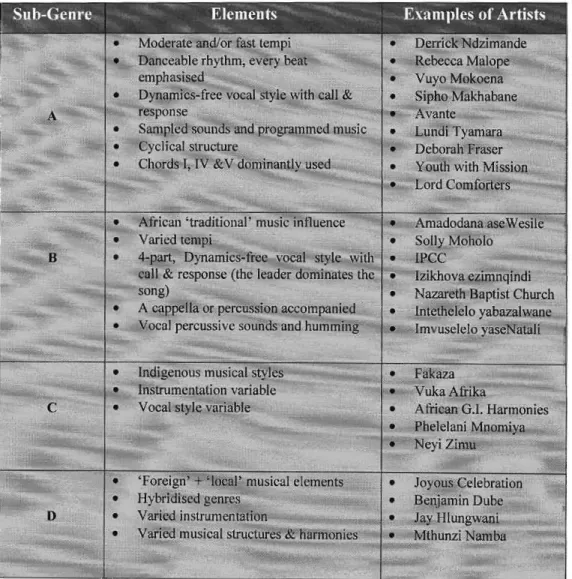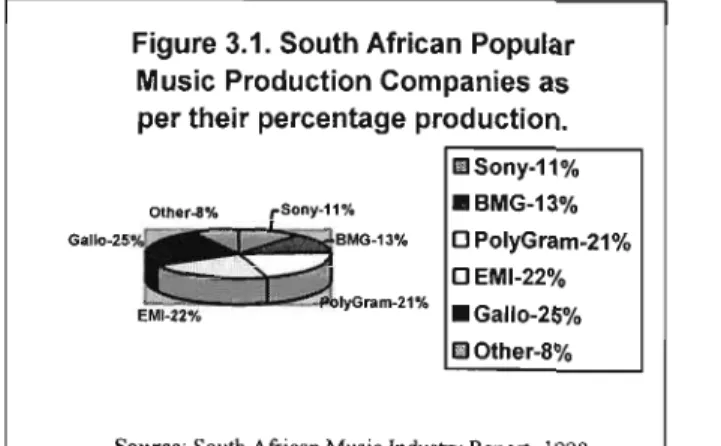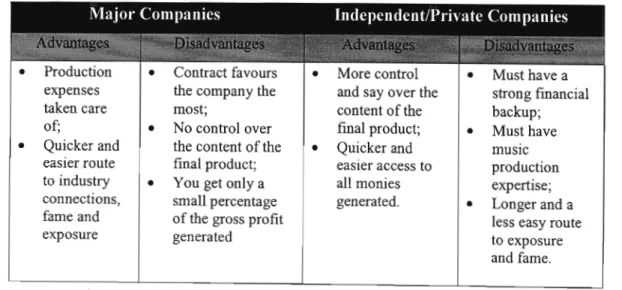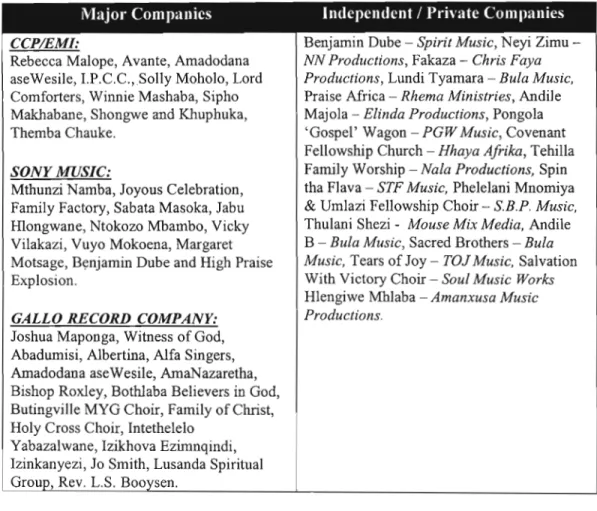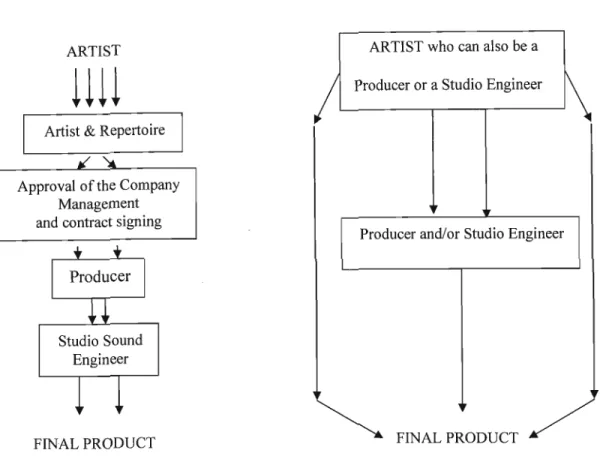This dissertation studies South African popular 'Gospel' music in the context of the new order of the post-apartheid era. South African popular 'Gospel' music is a broad and complex genre that has developed and grown over the years.
South Africa: The End of Apartheid and the Birth of Democracy
Mandela is one of the people who were frontline activists in the fight against apartheid in South Africa. The new order of democratic South Africa brought about many changes in music as a performing art.
Research Goals and Objectives
Literature Review
In Chapter 3 I look at the PRODUCTION process of South African 'Gospel' music and the role the music industry plays in the production of music. I am both an artist and a fan of South African 'Gospel' music and therefore have some insider knowledge about the local 'Gospel' genre and how it works.
GENRE
Introduction and theoretical framework
Ultimately, 'gospel' music is music whose theme is premised on the account of Christ's life and teachings, as in the Bible, and on the doctrines of the Christian religion. However, I use and agree with Cusic's indication of 'Gospel' music as music that became associated with 'blacks'.
History of 'Gospel' music
At the beginning of the 20th century, 'Gospel' music reached a new turn, when 'blacks' were able to publish their own music. They perform in the uniform of the church, with khaki pants and jackets, caps and boots.
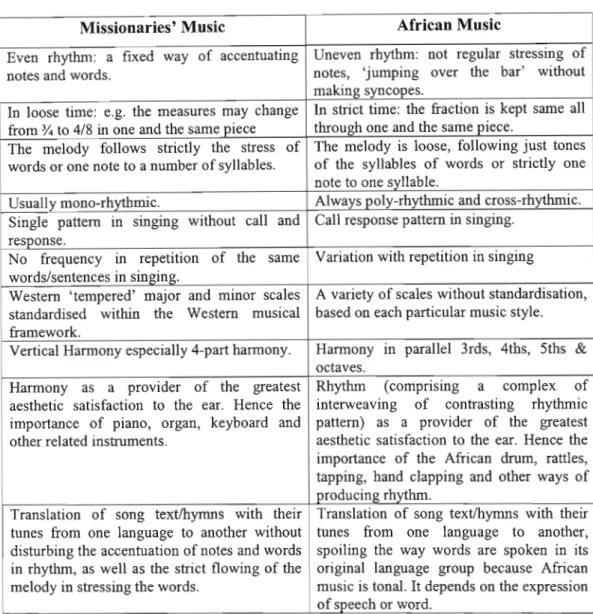
Elements of South African 'Gospel' music
Benjamin Dube, as I have hinted earlier, is also one of the very first artists to run under the local 'Gospel' banner. The use of 'isqamelo' to accentuate each beat in the 4/4 time signature emphasizes the rhythm. Most of the local 'Gospel' artists constantly cross generic boundaries, in the sense that they mix different generic styles in one album and even in one song.
Any South African 'Gospel' tune that doesn't fall into one of the above categories would undoubtedly belong here. According to Lindelani Mkhize, one of the well-known local 'Gospel' music producers, “South Africa is the only country in the world where Christian music is bigger than secular music.”17 South African 'Gospel' music is one of the greatest gems of local music and claim one of the largest audiences for popular music in the country.
This report further states that these 5 major companies controlled 98% of the South African music market in the first half of the year. Three of these companies are responsible for the majority of 'gospel' music produced in South Africa. Geoffrey Hull outlines the purposes of music production companies in his description of personnel within the structures of the music industry.
The most prominent people who work closely with the artist in the studio production of music are the A&R and the producer and/or sound engineer. These indies, according to SAMIR, were responsible for 8% of the music produced in South Africa in 1997.
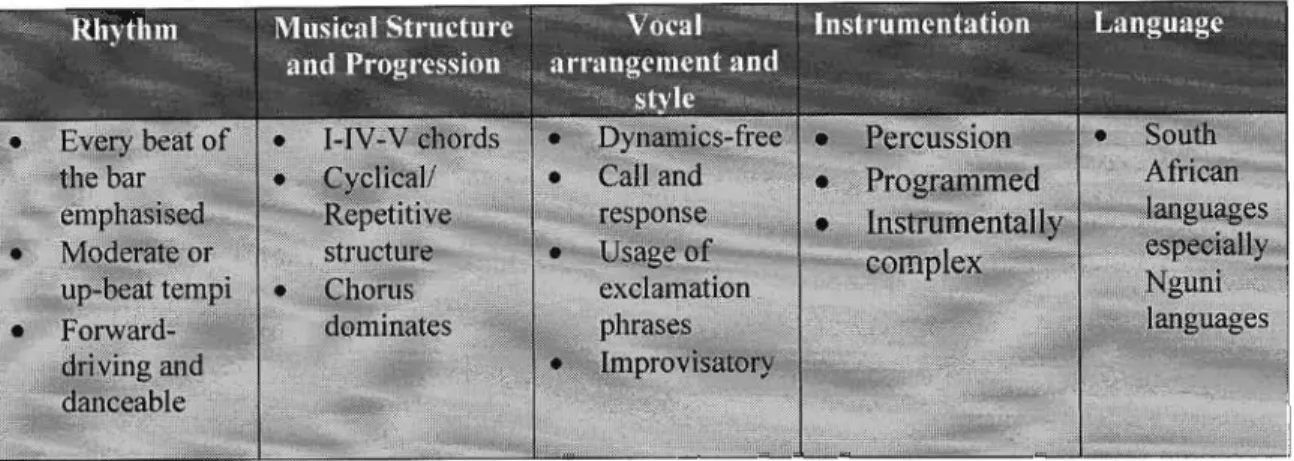
South African 'Gospel' music production and the end of apartheid
34; I had to sell music in taxis and buses, from the trunk of my car, because companies didn't think music was good enough for business," he said in the interview. He admits that he is now able to sell his music through major labels and even distribute it to retail stores through his private label, Amaxusa. This has enabled 'blacks' to sit on policy-making committees and their experiences and input have made the majors easily accessible to - and increased the number of - 'black' bands and artists signed to the majors.
The South African 'Gospel' music industry, as I have argued in this chapter, is controlled and directed by individuals who select the music and help shape the final sound available for public consumption. As has also been argued, the decision about what is and what is not included as a final product is primarily determined by the high expectations of the 'gatekeepers' that it will contribute to making the product more attractive and thereby boost sales . I would argue and conclude that this applies equally to both major record labels and indies.
Similarly, I argue that the 'gate-keeping' theory is valid in the production of South African 'gospel' music, whether by major companies or by indies. Finally, I would like to point to Negus' suggestion that "the work of people in the industry should not be dismissed as the activities of automated cogs in a machine, cynical bureaucrats or well-meaning but gullible puppets. Therefore, I would like to acknowledge great work by some local 'Gospel ' music producers for the good work and indelible input they have made and continue to make in the music industry in terms of discovering, nurturing and producing great talent that South Africa has witnessed.
MEDIA TION
Introduction
- Television
- SABC 1
- SABC2
I further traced local 'Gospel' music since the arrival of 'white' settlers and missionaries in South Africa. I surveyed the coverage of local 'Gospel' music on three radio stations that claim the highest listenership in South Africa. Local 'Gospel' music is broadcast sporadically on the show and there are no programs dedicated only to local 'Gospel' music.
Some music retailers, such as Jet Music, do not categorize local 'Gospel' music separately from other 'Gospel' music. My research showed that local 'Gospel' music is not well advertised in print media, especially magazines and newspapers. One of the mediums of mediation that has less material for local 'Gospel' music is the internet.
The other remarkable effect of the end of apartheid on the mediation of local 'Gospel' music, as SAMIR points out, is on the radio. This led to the scheduling of radio programs which increased the broadcasting of local 'Gospel' music on radio. The local 'Gospel' music programs discussed in 4.2.2 above are partly a result of the end of apartheid.
Conclusion
In its 20-page report to the minister, MITT recommended that the local content quota of 20% be raised to at least 50%36. However, it is a direct effect of democracy that people in music organizations like RISA could interact with the government on matters of public interest, resulting in the quota increase. 34;One of the major achievements of the nineties transformation was planning and creating new television channels to replace those launched during the great apartheid era 20 years before.
They were the result of significant public opinion research and were in line with the SABC's commitment to providing full services to all South Africans. Part of this historic change was the inclusion, for the first time, of all eleven official languages in TV program schedules, and the introduction of regional breakout programs3. My argument here is similar to the one I made above about radio, that previously the public as a whole had no say in major national structures such as the SABC.
In this chapter, I presented how local "gospel" artists and their agencies use radio, television, retail stores, print media, the Internet, and live performances to bring their music to consumers. These modes include a range of interactions, as radio DJs, station managers, television presenters and show hosts, salespeople, journalists and editors, venue operators, etc. they play an active role in the transmission of music. Through the modes of transmission discussed in this chapter, the local 'gospel' is readily available and readily available to the public for consumption, which brings me to my final central point of my dissertation.
CONSUMPTION
Introduction and the theoretical framework
This phenomenon allows the consumption of 'Gospel' music to reach deeper and beyond just music and entertainment. I randomly contacted 250 members of the general public who informed my research into local 'Gospel' music consumption. Seventy-five (39%) of the said fans/followers/supporters prefer contemporary 'Gospel', while sixty-eight (35%) prefer traditional 'Gospel', forty-six (24%) African 'Gospel', and four (39%) 2%) prefer 'other' (unspecified) styles of local 'Gospel' music.
Seven of them (4%) have most of their encounters with local 'Gospel' music from live performances. I have attended a number of live 'Gospel' music performances to study general trends of audiences in the consumption of the music. I have discovered a general trend in the audience-performer relationship during live performances of 'Gospel' music.
The audience of 'Gospel' music also pays a lot of attention to the music and the lyrics during live performances. Neyi Zimu attributed this to the 'spirituality' of 'gospel' music and its connection to Christianity. My research shows that different consumers of local “Gospel” music have different experiences with the music, as I discussed in this chapter.
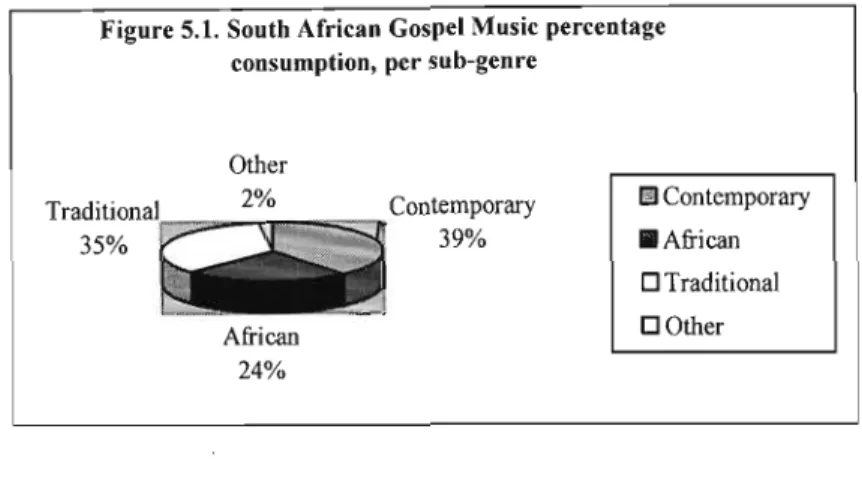
Executive Summary
Similarly, looking at the impact of the end of apartheid on local 'gospel' music has been a difficult but imperative task. I moved on to look at different ways in which South African 'gospel' music is communicated to its target audience. I then considered the effect the birth of democracy had on the dissemination of local 'gospel' music.
My attempt there was to explore the extent of the local 'Gospel' music audience by asking who consumes whose music, how and why. South African 'Gospel' music is the music of South African people and is informed and shaped by their cultures and the circumstances around them. As argued in this thesis, the new order of democracy played a decisive role and left indelible marks on the genre of local 'Gospel' music and on its production, mediation and consumption processes.
Local 'gospel' music is located in a music industry that is growing rapidly and has great potential. Artists/groups like Joyous Celebration, Rebecca Malope (on her TV show 'Gospel' Time') and others ensure a bright future for local 'Gospel' music. The recording industry of South Africa categorizes local 'gospel' music into 3 groups namely; Traditional, modern and Africa.
